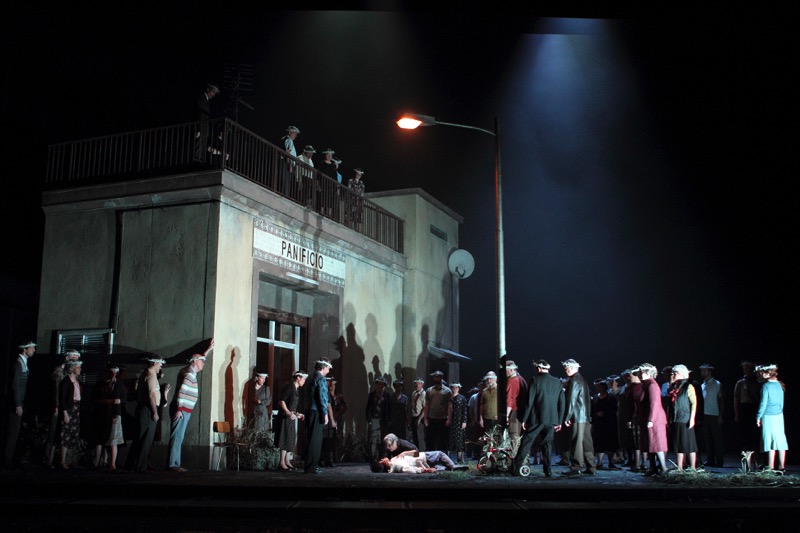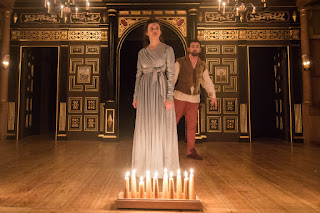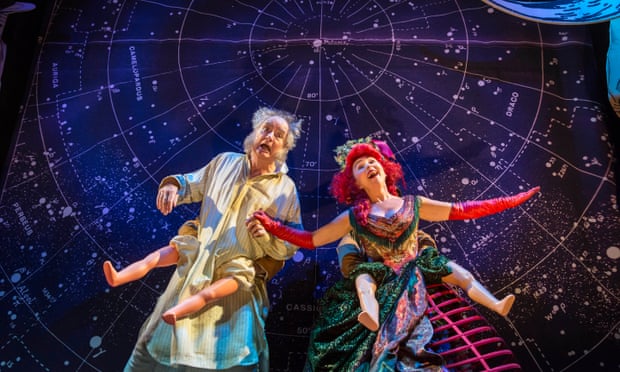West End Reviews
A rarely updated blog with bad speling :)
Monday, 1 June 2020
Caroline or Change, Minerva Theatre- 1st June 2017
Thursday, 28 May 2020
An Octoroon, Orange Tree Theatre- 29th May 2017
I have seen Ned Bennett’s Production of Branden Jacobs-Jenkins’
An Octoroon three times at both the Orange Tree theatre in Richmond and
in it’s successful transfer to the National Theatre and each time was a
profoundly different experience. In the Dorfman on the third visit, Bennett had
added pyrotechnics and crazier eccentricities to scale up the show to fit the
bigger space and to try and shock much the same audience who had seen Katie
Mitchell’s Cleansed in that same space just a few years earlier. The
second visit was towards the end of it’s first run at the Orange Tree, and word
had got around about just how stunning this production was. Bringing my friend
Harvey with me, we at 18 fitted into an uncharacteristically young audience in
the Richmond space; the production had found its audience and had attracted the
same crowd that flocked to see Pomona. However, it was the first visit to
this production that sticks in the memory most.
It was early in the run and the matinee audience was filled
with the regular Richmond matinee crowd- elderly and, I would venture, on the
conservative side of theatrical taste. They had seen that the theatre company
that has made its name on revivals of Rattigan and Shaw plays were mounting an
adaptation of a quaint melodrama by Dion Boucicault and thought it might make a
fun afternoon at the theatre. One of the joys of watching this profound and
challenging play was seeing the unease as Ken Nwosu as BJJ walked into the
centre of the theatre in his underwear before sitting within the audience in
his opening monologue on being a ‘black playwright’. That unease turned into
profound terror as Nwosu and Kevin Trainor (playing a representation of
Boucicault) circled each other screaming, before the theatre was plunged into darkness
as Snoop Dogg blared throughout before a live cellist accompanied a tap-dancing
br’er rabbit. As the melodrama itself started up, I could see one old lady
rocking back and forth with her hands over her ears. This visit, more than any
other time, I could see an example of an audience being really challenged about
what theatre was and could be, whether it was appreciated or not.
Re-reading the play yesterday as the video of the murder of
George Floyd at the hands of a Minneapolis policeman circulated around social
media, I was taken back to the fourth act of this play. Boucicault’s 1859 play is
a melodramatic entertainment surrounding a white, slave-owning protagonist George
Peyton saving an ‘octoroon’ (one eighth black) girl Zoe from evil, slave-owning
McClosky. The fourth scene, which Jacobs-Jenkins describes in his play as ‘the
sensation scene’, revolves around the Native American character Wahnotee
exposing McClosky’s villainy by showing a photo of McClosky killing Paul, a ‘slave
boy’. ‘BJJ’ breaks out of the play at this point to consider how to effectively
convey the shock of this moment to a modern-day audience, at which point a
large projection of a lynching is projected.
In Jackie Sibblies Drury’s Fairview, the
overwhelmingly white audience is directly asked to stand on the stage and let ‘people
of colour’ live their own lives free from the white gaze. That moment in the
fourth act of An Octoroon expresses much the same thing. Whether it’s
the developed photograph of the murdered Paul, the countless sickening photos
of lynching, the reports and videos of countless numbers of black people being
racially profiled by police in America and in the UK; there is something sick
about the white population that feeds off this need to see stories about black
people suffering at the hands of ‘evil’ white people. Yesterday, seeing less
people share the video and instead share examples of overt and covert white
supremacy was a step in the right direction at least yet still demonstrating a
kind of stasis in the brutalisation of black lives since the 19th
century.
Jacobs-Jenkin’s only major diversion from the plot of the
original melodrama is in the final act where, diverting away from the reunited
George and Zoe to a reflective and comical discussion between Dido and Minnie
in which, like most modern audiences trying to rationalise the plot of a melodrama,
they find that they either ‘zone out’ or find the whole thing pointless. The genius of this adaptation is that Branden
Jacobs-Jenkins transforms a pretty offensive and dated melodrama into a truly
nuanced and engaging work; one that really demands action from it’s audience
and only seems to gain ‘relevance’ over time.
Wednesday, 24 August 2016
Review Catch-Up: January
Cavalleria Rusticana/Pagliacci, Royal Opera House ****
 |
Funny Girl, Menier Chocolate Factory *****
Les Liaisons Dangereuse, Donmar Warehouse ***
Grey Gardens, Southwark Playhouse ****
Richard II, Barbican Theatre ***
Linda, Royal Court ****
Fear and Misery of the The Third Reich, Union Theatre ***
Gary Wilmott has brought was is claimed to be the first full production of Brecht's play to the Union and, if performed in August rather than in January, it could have been far more pertinent in explaining how sane people can succumb to the propaganda and fear-mongering pushed by politicians. We need a new adaptation to free the play and production from seeming dated despite Wilmott's best efforts to show that it is a situation that any group of people can fall into. This is a production and a play which, in the age of Brexit and Trump, is more thought- provoking than before.
Bull, Young Vic ****
Cymbeline, Sam Wannamaker Playhouse *****
 |
King Lear is similarly long and tough to watch, there is undoubtedly more to reap from the experience. Scofield's Lear occasionally comes across on screen as dull, even with cuts, but the meeting between mad Lear and blind Gloucester still brought tears to my eyes and the cinematography in Peter Brook's film is quite beautiful even if it isn't quite enough to fully grasp the beauty of the play.
 |
The Master Builder, The Old Vic **
Escaped Alone, Royal Court *****
Caryl Churchill's latest play is a magnificent meditation on loneliness is realised terrifically by James Macdonald. The jumps from Churchill's typical detached conversations to the terrifying streams of consciousness of Linda Bassett as Mrs Jarret wonderfully displace and confuse the audience but also contains a side-splittingly funny monologue about cats from Sally (Deborah Findlay) and an equally well constructed serious one from Vi (June Watson). It is so refreshing to see exiting new work containing wonderful parts for older female actors in a house which clearly acknowledges that everyone needs to be included in forging the future of theatre.
The Mother, Tricycle Theatre ***
London Symphony Orchestra- Antonio Pappano, Barbican Hall *****
 |
Sunday, 10 January 2016
wonder.land, National Theatre ***
Tuesday, 5 January 2016
A Christmas Carol, Noel Coward Theatre ***
 |